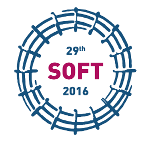Speaker
Andrius Tidikas
(Laboratory of Nuclear Installation Safety)
Description
Coolant activation is important concern for nuclear fusion devices, where water is being used in heat transfer systems. Production of nitrogen-16 isotope is one of the main hazards in such systems and should be taken with care. In this work, the examination of the neutron activation in water cooling systems, that might be used in future fusion devices, was carried out. Primary heat transfer systems for vacuum vessel, first wall/blankets and divertor, which might appear in ITER and DEMO projects, were examined, focusing on components that are relatively close to the neutron source. Assessment of activity and decay heat of water and functional materials was performed with respect to different localizations and structures. Contact dose rate and dose rate distribution in vicinity of 1 meter were also estimated. In addition, the possible influence of activated corrosion products in coolant was investigated and dominant radionuclides were identified. Calculations were made with few assumptions: flow rate of coolant is steady and uniform; activated coolant does not mix in other cooling systems; coolant is being reused for full fusion device operation period. Irradiation was simulated with activation system program FISPACT. Obtained results showed good agreement with other works in the available literature.
Co-authors
Andrius Tidikas
(Laboratory of Nuclear Installation Safety, Lithuanian Energy Institute, Kaunas, Lithuania)
Gediminas Stankunas
(Laboratory of Nuclear Installation Safety, Lithuanian Energy Institute, Kaunas, Lithuania)

